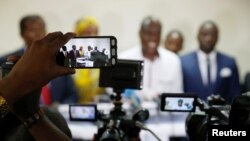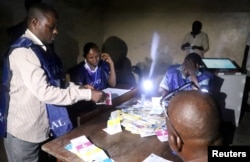The Democratic Republic of Congo said on Wednesday it had pulled accreditation for a French radio journalist and cut broadcasts from the station, as well as a local television channel, amid tensions over the counting of votes in crucial elections.
The authorities said accreditation for the Radio France Internationale (RFI) correspondent in Kinshasa, Florence Morice, had been withdrawn.
Government spokesman Lambert Mende accused Morice of violating electoral law and "the code of good conduct for foreign journalists covering the elections".
Accusing the station of stirring controversy, he said, "RFI's broadcasts have been cut off in all of Congo's cities."
"We are not going to let a radio station throw petrol on the flames at a time when we are waiting for the compilation of the provisional results," Mende said.
Mende said authorities also cut the signal of local Canal Congo television, seen as close to the opposition, for broadcasting election results ahead of an official announcement. A journalist at the station confirmed that its signal had been cut from 1500 GMT.
RFI maintains professionalism
RFI, a French public-service broadcaster, has a very large audience in the Democratic Republic of Congo, a French-speaking country of around 80 million people.
It has been closely covering Sunday's presidential elections and the marathon vote tally.
RFI issued a statement saying its coverage had been impartial and expressing full support for Morice.
She had been "merely working as a professional journalist," it said, and urged the authorities to reverse their decision to withdraw her accreditation.
On Tuesday, RFI said that its broadcasts had been blocked since Monday evening.
Preliminary election results are due by Sunday, definitive results by January 15, with the next head of state due to be sworn in January 18. Legislative and municipal elections also took place.
Suspicions
The elections will determine who succeeds President Joseph Kabila, at the helm of sub-Saharan Africa's biggest country for nearly 18 years.
Kabila refused to step down after his two-term constitutional limit ended in 2016, sparking protests that were quelled at the cost of scores of lives.
Among the DRC's opposition, suspicions run deep that the vote will be rigged to let his preferred successor, Emmanuel Ramazani Shadary, be declared winner.
Shadary and two leaders of the divided opposition -- Martin Fayulu and Etienne Tshisekedi -- are the perceived frontrunners in the vote.
Mende said RFI had been "declaring results (and) trends" as the vote count unfolded.
"Only the head of CENI can proclaim" these, he said, referring to the Independent National Electoral Commission, in charge of overseeing the elections and the count.
Internet cut
On Monday, the authorities cut off the internet, a move that opposition activists said sought to gag communications and stifle transparency.
An adviser to Kabila, Barnabe Kikaya Bin Karubi, on Tuesday said the move targetted the dissemination of "fake figures" to avert a "popular uprising."
But on Wednesday, Kikaya, speaking as spokesman for the coalition of governing parties, the FCC, called on the authorities to "show flexibility" and "rapidly restore (internet access) across the country."
"Among other things, the cut is hampering our system for collecting and compiling results," Kikaya said.
The European Union, United States, Canada and Switzerland on Tuesday urged the government to restore access.
The influential Roman Catholic Church, which is monitoring the election, said the internet cut had caused it to postpone by a day an interim report on the ballot that it had expected to published on Wednesday.
An alliance of citizens' group called SYMOCEL, the African Union and the Southern African Development Community (SADC) also deployed observers.
The African Union (AU) issued a statement Wednesday saying Sunday's vote had taken place "in a peaceful and tranquil atmosphere, despite interference and all the security, political and organizational challenges."
The head of the AU observation mission, former Malian President Diacounda Traore, met late Wednesday with the two main opposition candidates and a representative of Shadary.
"Africa has its eyes on you. Make sure we are not disappointed," Traore said after the meeting. "We told them to face up to their responsibilities."
The DRC has a long history of turmoil, and many fear a bloodbath if the elections go badly wrong.
The mineral-rich country has never had a peaceful handover of power since it gained independence from Belgium in 1960.
Millions of people died from fighting, starvation and disease in two full-fledged wars between 1996 and 2003, and bloodshed marred elections in 2006 and 2011.





